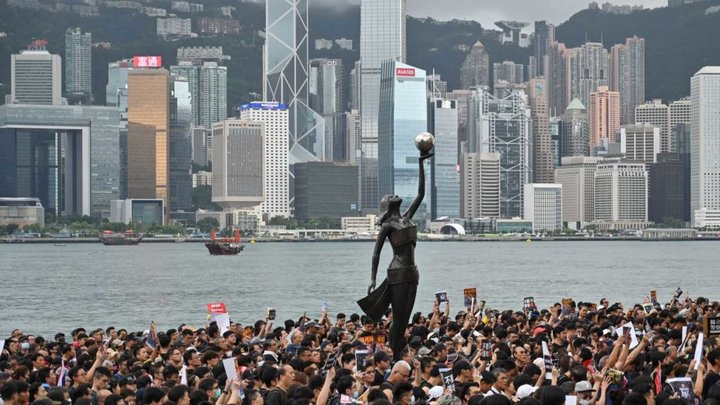It has now been 3 months since the first anti-government protest erupted in Hong Kong but the will of the people show no signs of stopping. Several weeks of rallies and demonstrations have not dampened their spirits in any way — in fact, it seems to have only grown stronger. Despite violent mobs, aggressive police, and veiled threats by China the protests continue. And they affect more than just the citizens in Hong Kong.
But to understand why the protests occurring are of such epic proportions, you have to consider the whole situation. Let’s start at the beginning, at the root cause of all this tension.

Hector Retamal / Getty Images
(LOOK: Students Multitask By Spending Time At Protests Studying)
Hong Kong’s History (With China)
For quite a while there was a lot of confusion over Hong Kong’s relationship with China. There was a time when people had to ask whether Hong Kong was an independent city or if they were a part of China. It was likely confusing because the answer is both.
Hong Kong existed as a British colony for 150 years until the early 1980s, when the 99-year lease on the island was expiring. China’s communist government demanded its return but ultimately settled on a deal with the United Kingdom. Hong Kong would officially return to China under the principle of “one country, two systems”.
This agreement allows Hong Kong to act nearly autonomously of China, having its own distinct form of governance. What this looks like is the citizens of Hong Kong enjoying rights and freedoms, and operating under an independent justice system.
However, this agreement would only stand for 50 years. The end of it would see Hong Kong fully subsumed under China and those 50 years are nearly up. But the Hong Kong citizens are nowhere nearer to accepting Chinese rule.
Rising Tensions
Instead of Hong Kong citizens gradually coming to embrace China, the opposite has happened. They cling tighter to the freedoms presently afforded to them and seek to defy Chinese influence on the island.
The disappearance of five Hong Kong booksellers and one tycoon (and their subsequent reappearance in China) raised concerns of meddling in Hong Kong affairs. Legal rulings which disqualify pro-democracy legislators is seen as undue influence. Incidents like this have Hong Kong fear for their civil liberties.
Even more pressing is Hong Kong’s desire for democratic reform. As it stands, they are denied a democratic election for their Chief Executive. The position is, instead, voted on by a 1,200-member election committee with strong pro-Beijing sentiments.
Hong Kong-China Extradition Treaty
In 2018, a Hong Kong man allegedly killed his pregnant girlfriend while on vacation in Taiwan. He made it out of the country and back to Hong Kong before officials could apprehend him. They were unable to demand his return as no extradition agreement exists between Taiwan and Hong Kong, due to China’s relations with the former.
The incident opened up discussions on the similar lack of an extradition agreement between Hong Kong and China. Though the link is faint, the extradition treaty was attributed to address situations such as this.
Hong Kong’s extradition treaty with China was formally announced in April of this year. It was met with resistance from the start though resistance for its passage reached an all-time high in June. Hong Kong’s already rocky relationship with China fueled the opposition of the bill and encouraged them to take action.
The Protests: Week 1
Who said people don't want democracy? Autocrats, beware. #HongKong https://t.co/9S5pe3ZAOm pic.twitter.com/aF7uHaQltF
— Kenneth Roth (@KenRoth) June 17, 2019
(Nearly 2 Million People Take To Hong Kong Streets In Protest)
The first truly significant protest against the treaty took place on June 1. An estimated 1 million individuals are believed to have participated. The next protest on June 12 is believed to have reached a record-breaking 2 million participants. Violent clashes began to occur as early as this first week with police firing rubber bullets and spraying tear gas into the crowd. Demonstraters allegedly threw bottles and pieces of trash at them.
On June 15 Chief Executive Carrie Lam suspended discussions on the bill.
Week 2
Despite the suspension of the extradition bill protests continue. An estimated 2 million protestors march against Lam’s refusal to completely withdraw the bill.
Week 3
Over 100 protestors storm the Revenue Tower and occupy the tax office. They do this in order to stall government operations and inconvenience them.
Week 4
It was in July that the Hong Kong government began using a colonial-era anti-rioting law to charge detainees from the protests. This only served to further incite the people’s anger.
Protestors include this development and police brutality to their list of grievances.
On July 1 protestors break into the Legislative Council building. They destroy furniture and portraits of pro-China politicians. An annual pro-democracy march takes place at the same time in defiance of Hong Kong handover’s anniversary.
Week 5
The extradition bill is declared dead on July 9. However, Lam leaves open the possibility for later discussions as it was not functionally withdrawn.
This refusal to withdraw the bill completely only further aggravated citizens. Protestors begin to demand more from the government — mainly, universal suffrage. Hong Kongers divert their attentions to pursuing a more democratically elected government.
Week 6
Probably the most riveting picture tonight, the kind you can only take in #HongKong: an odd mash-up of skyscrapers, smoke, trees, barricades, umbrellas, laser, and masked protesters in the backdrop. This is revolution in our 21st-century postmodern metropolis 🌃💨🌲🚧☂️🔦👥👥👥👥 pic.twitter.com/a7SL0m4Mtu
— Jeffrey Ngo 敖卓軒 (Til Dawn Edition) (@jeffreychngo) August 31, 2019
(LOOK: 2 million people went out to protest and left the road spotless after)
Protests continue and turn even more violent. A peaceful protest by Sha Tin mall transforms volatilely when the police chase down protestors afterward. Fights break out and there are injuries on both sides.
Week 7
Protestors deface China’s national emblem on a government office on July 21. They are brutally attacked by a mob of more than 100 with rods. The mob swarmed Yuen Long station and assaulted those wearing black. Dozens were injured.
The incident deepened anger towards the police as they are believed to have let the incident happen. It similarly deepened anger at China who is believed to have orchestrated the attack. After this point, protests begin to escalate violently. Bricks are thrown at buildings, fires are lit, and police use teargas more liberally.
On July 26, around 15,000 protestors occupy the airport.
Week 8
Demonstrations against police brutality take place on July 28. Roads are blocked and fires are lit while police deploy tear gas, rubber bullets, and pepper spray.
In defiance of political neutrality, some 40,000 civil servants attend and organize their own protest on August 2.
Week 9
The scene at Hong Kong’s airport, where thousands of protesters have flooded the terminal. The airport took the rare step of canceling all flights and shutting down. pic.twitter.com/BV559oF5NU
— Javier C. Hernández (@HernandezJavier) August 12, 2019
(Here’s What Disney Actress Crystal Liu Did To Spark The #BoycottMulan Movement)
On August 5 a general strike with far-reaching consequences takes place. Businesses close their doors, flights are grounded, and subway lines are inoperative. Police stations are besieged and the police respond with over 800 rounds of tear and 148 arrests.
On the same day, Lam accuses protestors, saying “they want to topple Hong Kong, to thoroughly destroy the livelihoods that seven million people cherish.”
Yang Guang, an official in Beijing’s office for Hong Kong affairs, also issued a statement: “I want to warn all the criminals to not wrongly judge the situation and take restraint for weakness. [A] blow from the sword of law is waiting for them in the future.”
Week 10
Violence from the police reaches new heights. A woman’s eye is ruptured from a police-fired beanbag, tear gas is launched inside a subway station, and protestors are chased away by pepper ball rounds.
In reaction to the police’s excessive use of force, a large-scale airport occupation is triggered. Hundreds of flights are canceled as protestors take over the Hong Kong airport.
Week 11
Protests continue throughout the week. August 18’s demonstration is believed to be 1.7 million-strong. Smart lamposts are taken down in fear of surveillance.
Week 12
#HongKongProtests
Terror and confusion reign as riot police charged into a train at Prince Edward MTR station on Saturday and began indiscriminately beating passengers. Some are reduced to crying inconsolably.#HongKong #ExtraditionLaw#HongKongProtesters pic.twitter.com/MNAszlgNlj— Geeta Mohan گیتا موہن गीता मोहन (@Geeta_Mohan) September 1, 2019
(Filipino gets arrested for wearing black shirt near protest area in Hong Kong)
Both sides erupt in violence. Protesters throw bricks and Molotov cocktails while police use water cannons for the first time. There is even a live warning shot from a gun.
On August 29 Andy Chan, a Hong Kong independence activist, is arrested in the airport. Agnes Chow and Joshua Wong, leaders of the pro-democracy organization Demosistō, are also arrested the following day.
So Why Should Filipinos Care?
The events of these past few months clearly show the magnitude of these protests as well as their expansive reach. It’s necessary for Filipinos to understand the events taking place on this island due to our proximity and large OFW population. This reality affects our fellow Filipinos living and working in Hong Kong, not just practically but legally as well. There are already concerns over maintaining working visas or detainment of protest participants.
(Overseas Filipino Workers Participating In Hong Kong Protests May Lose Their Visa)
Of course, the safety of migrant workers and even Filipino tourists is another important issue. With the continued mounting aggression of the Hong Kong police and fears of imminent Chinese intervention through the People’s Liberation Army, the only thing to do is watch what happens next.
Ultimately, Hong Kong’s status as an international city denotes its intrinsic ties to countries around the globe. The events taking place in Hong Kong have repercussions that go beyond its shores and affect so much more than just the Hong Kongers.
How do you feel about the protests taking in place in Hong Kong? Share your thoughts and opinions with us in the comments!
Sources: World Magazine, BBC, NY Times, GQ




